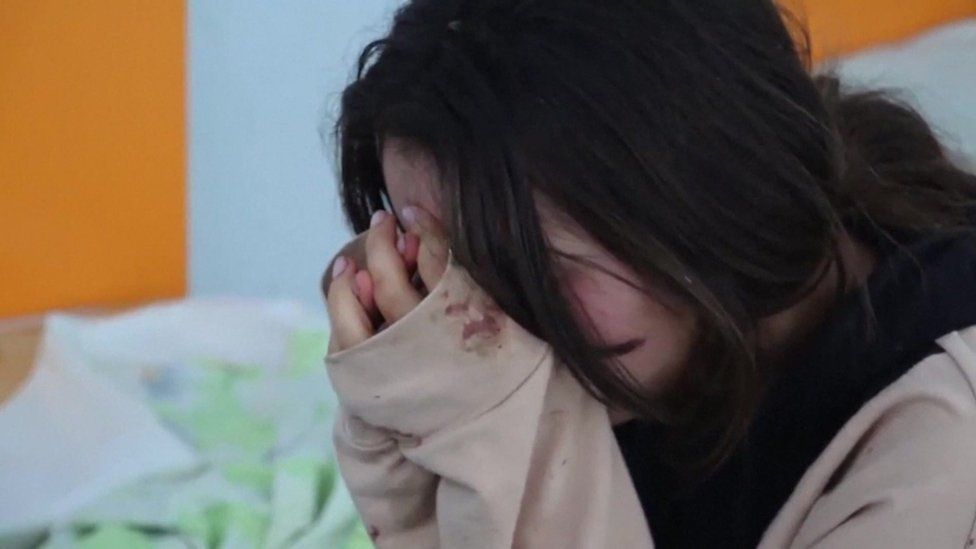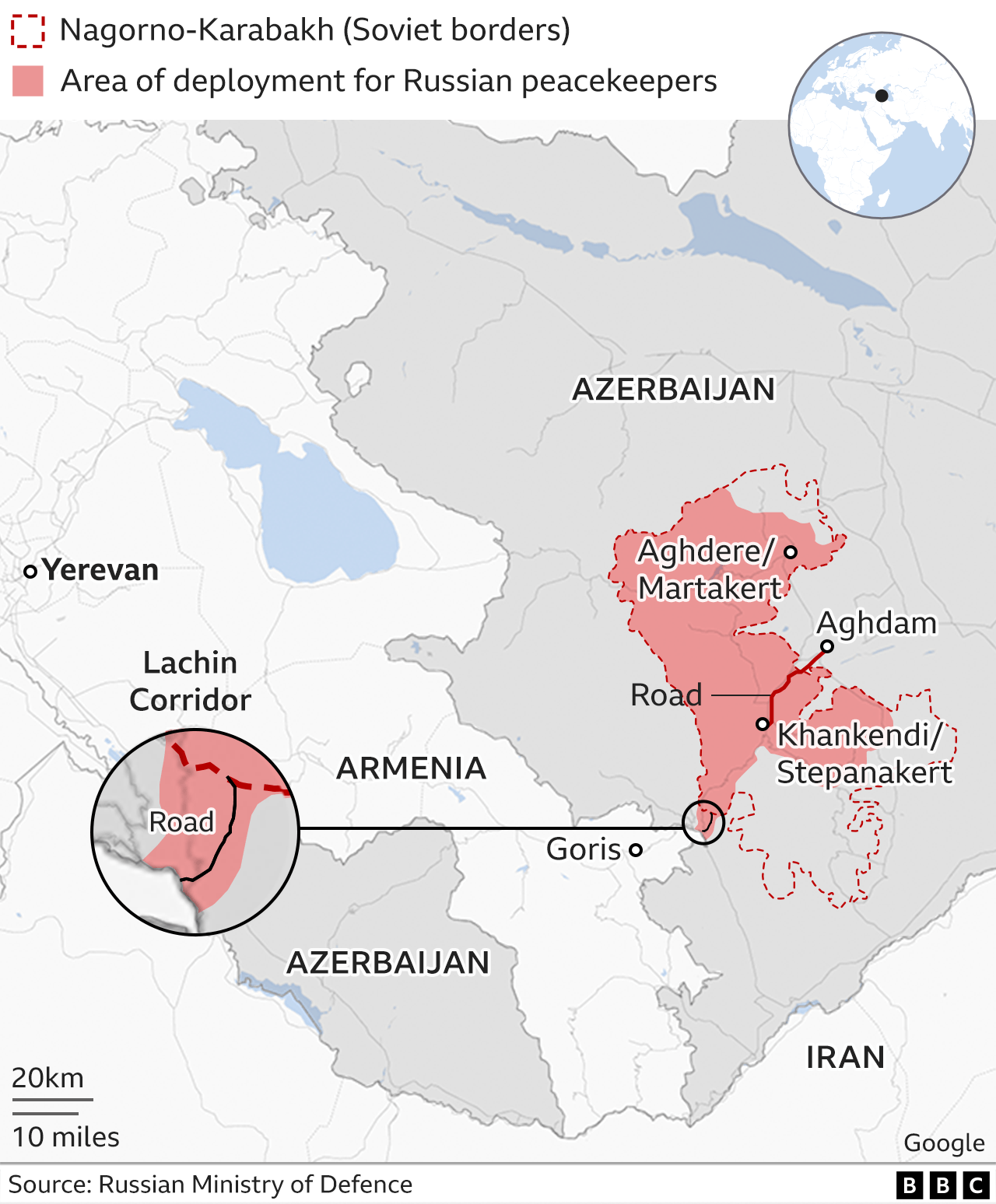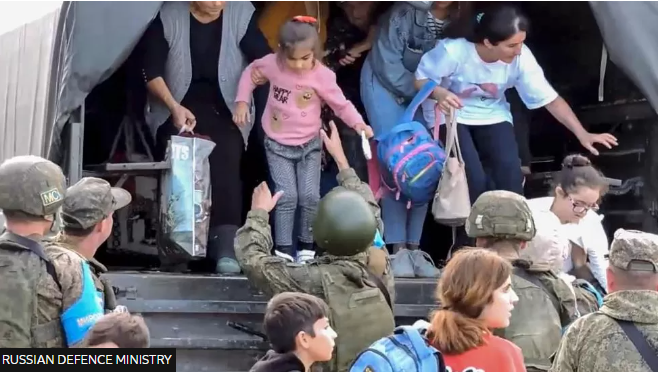Azerbaijan's president has declared that his country's sovereignty has been restored over Nagorno-Karabakh after a 24-hour military offensive against ethnic-Armenian forces.
Ilham Aliyev praised the heroism of Azerbaijan's army hours after Karabakh forces agreed to surrender.
Some 120,000 ethnic Armenians live in the South Caucasus enclave, recognised internationally as part of Azerbaijan.
Azerbaijan now intends to bring the breakaway region under full control.
Its military launched an "anti-terror" operation on Tuesday, demanding that Karabakh's forces raise a white flag and dissolve their "illegal regime". With no means of support from neighbouring Armenia, and after an effective nine-month blockade, the ethnic Armenians soon gave in.
Armenian officials reported that at least 32 people were killed, including seven civilians, and another 200 wounded. However according to a separatist Armenian human rights official, at least 200 people were killed and more than 400 wounded. The BBC has not been able to verify any of the figures.
On Wednesday evening, Armenian officials accused Azerbaijan of opening fire on troops near the town of Sotk on the border between the two countries after the ceasefire had been agreed, but Azerbaijan immediately denied the claims.
Earlier in the day, thousands of protesters took to the streets of Yerevan, the Armenian capital, to demand the resignation of Prime Minister Nikol Pashinyan for his handling of the crisis.
Azerbaijan's army said it had captured more than 90 positions from the ethnic Armenians before both sides announced that a complete cessation of hostilities had been agreed through Russian peacekeepers, starting at 13:00 local time (09:00 GMT) on Wednesday.
Under the terms of the truce, outlined by Azerbaijan and Russia, which has peacekeepers on the ground, local Karabakh forces must commit to being completely disbanded as well as disarmed.
There is also a commitment to Armenian forces pulling out, even though its government denies having any military presence there.
Talks between officials from Baku and Karabakh's Armenian representatives on "issues of re-integration" got under way in the town of Yevlakh on Thursday morning.
President Aliyev said Azerbaijanis had nothing against the population, only their "criminal junta".
Yevlakh is some 100km (60 miles) north of Karabakh's regional capital, Khankendi, known as Stepanakert by Armenians.

Civilians flee to airport
Marut Vanyan, a journalist in Karabakh, said many families had spent Tuesday night in basements: "I didn't sleep and I didn't eat. It's calm now but it's a strange feeling. Right now, what we need to do is stop this bloodshed and understand what to do next."
Russia said its peacekeepers had evacuated 5,000 people from dangerous areas since the offensive had begun, the country's Interfax news agency reported.
As the ceasefire was announced, Karabakh officials appealed to residents to remain in shelters and not to leave for the local airport, adjacent to a Russian peacekeeping base. However, a crowd of civilians had soon gathered close to the airport and as darkness fell hours later it was unclear what support they would have.
Caucasus specialist Thomas de Waal of Carnegie Europe said the terms of the ceasefire and the coming talks were very much on Azerbaijan's terms and left ethnic Armenians looking unprotected.
"This looks like the end of a 35-year-old project, some would say a century-old project, of the Armenians of Karabakh to secede from Azerbaijan," he told the BBC.
"We're probably, unfortunately, seeing a project whereby the Azerbaijanis offer so little to the Karabakh Armenians that most if not all of them will leave."
Armenian Prime Minister Nikol Pashinyan made clear his government was not involved in the ceasefire text and demanded that Russian peacekeepers take full responsibility for the safety of the local population. On Tuesday he accused Azerbaijan of "ethnic cleansing" in Karabakh.
Azerbaijan's presidential envoy Elchin Amirbekov told the BBC that Russian peacekeepers had helped facilitate the ceasefire: "I think they have to be counted on for the implementation part."
An ongoing crisis
Since the collapse of the Soviet Union, Armenia and its neighbour have fought two wars over Nagorno-Karabakh, a mountainous, landlocked region in the south-west of Azerbaijan.
The six-week war in 2020 led to several thousand deaths but enabled Azerbaijan, backed by Turkey, to recapture territory surrounding and inside the enclave, leaving the ethnic Armenians isolated.
For the past nine months, Azerbaijan has conducted an effective blockade of the only road into Karabakh from Armenia, known as the Lachin Corridor. Ethnic Armenians in the enclave complained of shortages of food, medicines and toiletries and Armenia was unable to help.
Although some aid was allowed through in recent days, the Karabakh Armenians were very much weakened by the shortages by the time of the Azerbaijani offensive, with little hope of external support.
Some 2,000 Russian peacekeepers were supposed to monitor the 2020 ceasefire but Moscow's interest in Armenia has waned during its war in Ukraine, even though Armenia is part of Russia's CSTO military alliance.
Last May, the Armenian prime minister was quoted as saying his country would be ready to recognise Karabakh as part of Azerbaijan in return for the security of the ethnic Armenian population.
"The 86,600 sq km of Azerbaijan's territory includes Nagorno-Karabakh," Mr Pashinyan was quoted as saying, referring to Azerbaijan as a whole.
Russia has also been annoyed by Mr Pashinyan's apparent pivot to the West.
Earlier this month his wife Anna Hakobyan shook hands with Ukraine's president at a conference in Kyiv, and this week, dozens of Armenian and US soldiers took part in military exercises together.
The Kremlin has denied Armenian allegations that it did not do enough to help its ally.
President Vladimir Putin said only last week that Russia had no problems with Armenia's prime minister, but added: "If Armenia itself recognised that Karabakh is part of Azerbaijan, what should we do?"
Hundreds of protesters in Yerevan called for the prime minister to resign on Tuesday because of his handling of the crisis and he warned of unidentified forces calling for a coup.
Armenia-Azerbaijan: Nagorno-Karabakh map

Latest Stories
-
NDC Mining Committee for 2024 campaign refutes allegations of recruiting thugs for elections
1 min -
Traction Control: A lifesaver with an off switch? Here’s why it exists
5 mins -
I don’t need anyman to woo me with money – Miss Malaika 2024 winner refutes pimping claims
12 mins -
”Kurt Okraku sabotaged my national team career because I refused to sign with Dreams FC” – Najeeb Yakubu
13 mins -
Businesses urged to leverage Generative AI for enhanced customer engagement
16 mins -
MultiChoice Ghana partners with Ghana Hotels Association to elevate guest entertainment
25 mins -
Bawumia’s music streaming app or Mahama’s pay-per-view TV channel?
30 mins -
Karpowership Ghana empowers 40 Takoradi Technical University students with scholarship
32 mins -
We expect significant reduction in prices of petroleum products in coming weeks – CEO AOMC
45 mins -
Betway Africa offers once-in-a-lifetime ‘Play-on-the-Pitch’ experience at Emirates Stadium
54 mins -
I coined the term ‘hype man’ in Ghana – Merqury Quaye
60 mins -
Vasseur questions ‘strange momentum’ of Formula One race director change
1 hour -
“I am disappointed in Kojo Manuel” – Merqury Quaye on “no tie” comment
1 hour -
Nana Kwame Bediako; The beacon of unity
1 hour -
Western Region: NDC youth wing embarks on phase 2 of ‘retail campaign’
2 hours

